Photo

The New South Wales government has quietly amended its public health restrictions, lifting the ban on protests in the state. There was no official announcement—they didn’t want to admit it—but we had won.
The victory came a week after 300 students and staff mobilised at Sydney University, once again facing down the police. Scenes of University of NSW education officer Shovan Bhattarai being thrown through the air and injured by riot police, and even a professor of law, Simon Rice, in his suit, being tripped and shoved to the ground and arrested, made headlines. Videos of the police violence and student defiance were viewed nearly 100,000 times. Outrage at the heavy-handedness was widespread, and the pressure on the government was mounting.
These incidents came after another brilliant show of defiance in early October, when 500 protesters stormed into Sydney’s Taylor Square before running past police lines to march down Oxford Street, the symbolic site of Sydney’s Mardi Gras, to oppose transphobia and homophobia. This was despite the state Supreme Court ruling the rally “unauthorised” the day before. The police shoved, kettled, arrested and fined protesters, but the overall mood was of joyous rebellion and victory as people showed they would not be cowed. The rally drew an outpouring of support.
READ MORE: How we won back the right to protest in NSW
15 notes
·
View notes
Photo
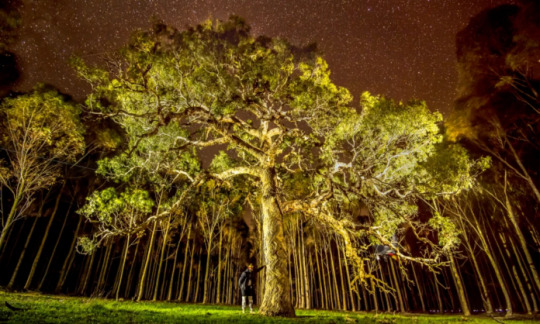
On the same day Victorians were celebrating Premier Daniel Andrews’ announcement of the easing of the 112-day COVID-19 lockdown, the state government oversaw the felling of a 350-year-old tree sacred to the Djab Wurrung people in central Victoria. The tree was destroyed to make way for a multi-million-dollar highway upgrade.
More than 50 protesters were attacked and arrested by Victoria Police, who weaponised COVID-19 laws by fining at least 40 protesters for failing to comply with COVID-19 measures. A further ten protesters were arrested for obstructing police.
The $672 million Western Highway upgrade between Ballarat and Stawell began in 2013, but work on the Buangor to Ararat section did not begin until June 2018. Work in this section will result in the destruction of more than 3,000 trees, including at least 200 which hold cultural significance to the Djab Wurrung people. Among the trees are traditional birthing trees, to which Aboriginal women have come to give birth for hundreds of generations. The area holds “a deep intimate connection for Djab Wurrung women”, wrote Djab Wurrung woman and recently resigned member of the First Peoples’ Assembly of Victoria, Sissy Eileen Austin, in the Guardian.
READ MORE: Djab Wurrung: fighting to save sacred trees
4 notes
·
View notes
Photo

Issue 174 of Red Flag is out now
With 8 pages of analysis on the results of the US election, and the prospects for workers and the oppressed, both in the US and internationally, under Democratic Party rule. One thing we know: without resistance, nothing is going to change for the better.
Red Flag aims to play its role in fostering and giving voice to that resistance. Become a subscriber at subscribe.redflag.org.au, and help support a socialist voice in Australia's right-wing media terrain.
6 notes
·
View notes
Photo
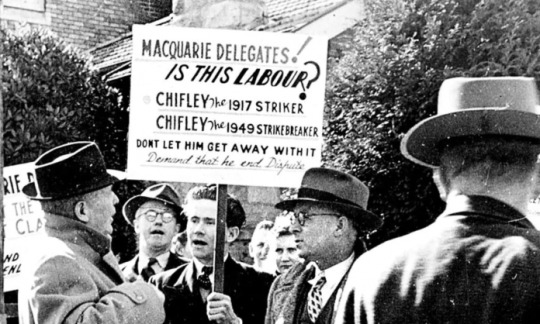
“If the order is given to fire, don’t let me see any rifle pointed in the air; fire low and lay them out”, Lieutenant-Colonel Tom Price told his troops the day before confronting striking maritime workers in 1890. While no-one was shot, the action against workers continued a tradition of using troops to put down Indigenous and convict resistance and unrest in colonial Australia.
Fast forward to last month, when Prime Minister Scott Morrison refused to rule out the use of the armed forces on the wharves against workers who, he said, were “holding the country to ransom” with “straight-out extortion”. Striking workers in Australia have often been threatened with military force.
Troops were first used at the Lambton Colliery in the Hunter Valley in 1888, but their most notorious use was in the deep recession several years later, when the military was used against striking waterfront workers and shearers.
READ MORE: Using soldiers to smash strikes
3 notes
·
View notes
Photo

Many scientists today agree we are living through a new geological epoch—the Anthropocene. It is an age defined by human activity, characterised by a reduction in biodiversity, an increase in the concentration of atmospheric carbon dioxide, the use of nuclear weapons, the impact of industrial processes and changes to the Earth’s surface as a result of mining, construction and erosion. One of the most disastrous features of this activity is the massive and increasing production of plastic, a material once synonymous with progress and innovation but which is now threatening the viability of the planet on which we all depend.
A glimpse at the world’s oceans reveals the dimensions of the problem. A 2017 study from the Ellen MacArthur Foundation found that by 2050, Earth’s oceans will contain more plastic than fish. Already, there are huge, submerged, moving concentrations of waste in every one of the planet’s oceans, known as garbage patches. The Great Pacific Garbage Patch, which lies between Japan and California, for example, is twice the size of Texas and continually growing. It acts like a vortex, pulling ever more rubbish into its centre.
READ MORE: Plastic capitalism is killing the planet
18 notes
·
View notes
Photo
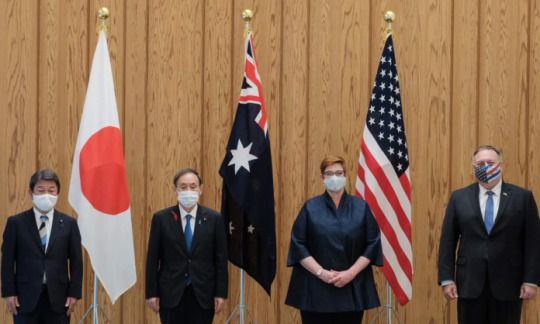
Diplomatic relations between Canberra and Beijing have never been worse. In early October, Foreign Minister Marise Payne visited Tokyo to attend a meeting of the “Quad”—the four countries most concerned with the rise of China in the Asia Pacific: Japan, the US, Australia and India. The meeting discussed how the four nations might reduce their dependence on China for the supply of certain minerals and technologies, as well as how they might combat disinformation campaigns from authoritarian governments. China’s vice foreign minister denounced the meeting as “an anti-China front-line” or “mini-Nato” which reflected a “cold war mentality”.
The meeting came towards the end of a year marked by a tit-for-tat struggle between Australia and China. In May, China put up tariffs on Australian barley and suspended beef imports after Prime Minister Scott Morrison backed an inquiry into the origins of COVID-19 that was widely seen as an attempt to blame China for the pandemic.
READ MORE: Canberra and Beijing: economic ties, geopolitical tensions
1 note
·
View note
Photo
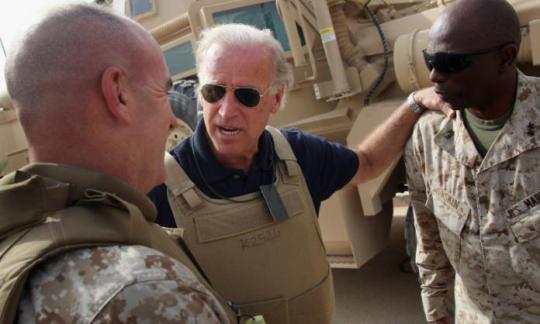
The US military establishment will breathe a sigh of relief at Joe Biden’s victory in the presidential election. Nearly 800 former high-ranking military and security officials penned an open letter in support of the Democratic candidate during the campaign. A who’s who of former generals, ambassadors, admirals and senior national security advisers—from former Secretary of State Madeline Albright to four-star admiral and Bush-era Deputy Homeland Security Advisor Steve Abbot—backed Biden as the best bet to revive US power. A month earlier, 70 national security officials who served in Republican administrations threw their weight behind Biden (the list soon grew to 130), arguing that, on foreign policy, Trump “has failed our country”.
Why was Biden the war criminals’ candidate of choice? The foreign policy chaos and controversy of the Trump years were a symptom of a global superpower in relative decline, with no real strategy out of the quagmire.
READ MORE: Why the military establishment backed Biden
7 notes
·
View notes
Photo
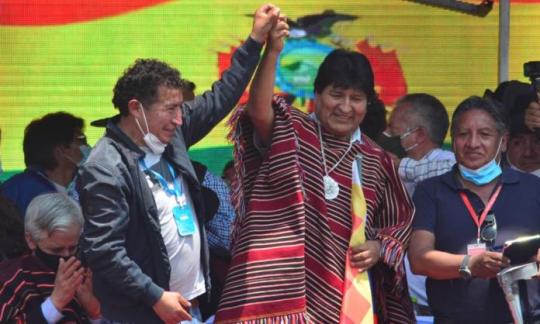
Almost a year after being overthrown in a right-wing coup, the Movimiento al Socialismo (Movement Toward Socialism, or MAS) emerged victorious in Bolivia’s presidential elections, held across the country last month. Despite hundreds of troops and police patrolling the streets on election day—and a campaign of intimidation and persecution that attempted to jail MAS presidential candidate, Luis “Lucho” Acre, along with dozens of other leading party officials—MAS won 55 percent of the vote, securing a two-thirds majority in the Chamber of Deputies of the Plurinational Legislative Assembly (ALP). The centre-right candidate, Carlos Mesa, and his Comunidad Ciudadana (Civic Community, or CC) received 29 percent of the vote. The fascist candidate, Luis Fernando Camacho, and his newly formed Creemos (“We Believe”) coalition, won 14 percent.
The result is a humiliating defeat for the pro-coup coalition: sections of the urban middle classes, large-scale agribusiness, cattle-ranchers, loggers and extractive capitalists of Bolivia’s eastern lowland departments, the police, armed forces, judiciary, fascist paramilitary gangs and their political representatives in Jeanine Áñez’s “interim” regime installed last November. And the result is a clear rejection of the coup-bloc’s pro-business and racist agenda by the country’s working-class and Indigenous majority.
READ MORE: Bolivia’s right wing has been defeated electorally. But they promise to strike again
9 notes
·
View notes
Photo
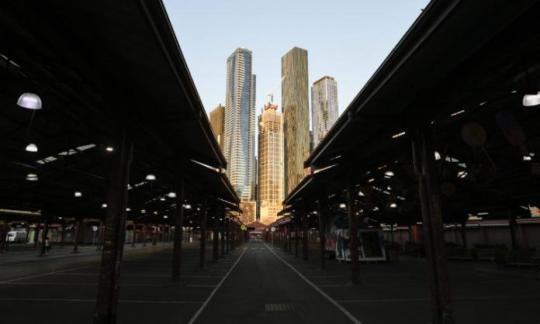
On 30 July, Melbourne recorded 721 cases of coronavirus. The growing crisis pushed Premier Daniel Andrews into implementing a statewide lockdown that involved shutting down non-essential industries and curtailing a range of social activities. Now, as much of the world grapples with a second wave of the deadly virus, Melbourne has recorded zero daily cases for nearly two weeks.
Most Victorians are celebrating the easing of restrictions, pleased that their sacrifices have paid off. That they overwhelmingly abided by the restrictions reflects a strong sense of social solidarity, and countless lives have been saved as a result. So while it is true that the second wave was a product of the Andrews’ government’s neoliberal approach to managing the quarantine program, it must now be judged by its response to that wave. On the whole, the government has been overwhelmingly effective.
Despite this, Andrews has for months now been the target of vicious attacks. In the topsy-turvy world inhabited by the political class, the true calamity of 2020 is not the deadly virus that has killed more than a million people globally, but the measures that have successfully prevented that from happening here in Australia.
READ MORE: The evidence is in: lockdowns work
4 notes
·
View notes
Photo
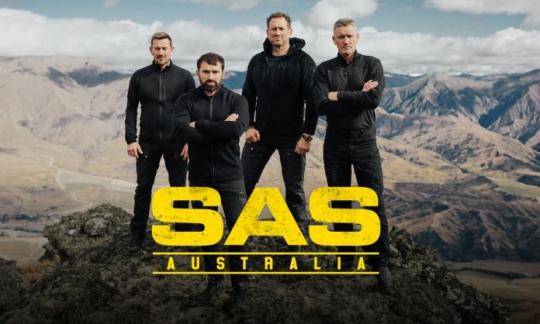
Reality television is bad enough at the best of times. Channel Seven’s bizarre new show SAS Australia, however, really plumbs the depths. Those behind the show are apparently unconcerned that their celebration of the culture of the Australian Special Air Service (SAS) comes hot on the heels of a string of revelations about war crimes committed by the SAS in Afghanistan. It’s as if a US network had launched a program during the Vietnam War in which B-grade celebrities were trained in the use of napalm.
A four-year inquiry into the SAS’s crimes in Afghanistan is nearing completion. It’s likely limited findings will be released to the public, but several disturbing accounts have already come to light. The incidents vary in their details, but reports of torture, execution and cover-up surface again and again, with one special forces insider telling the Age of a culture of “sanctioned psychopathic behaviour”.
A confidential 2016 report by defence consultant Samantha Crompvoets, leaked to the media in 2018, is the source of many of the revelations. Crompvoets related countless stories of human rights abuses carried out by SAS troops.
READ MORE: SAS Australia: TV's celebration of war criminals
6 notes
·
View notes
Photo

Red Flag isn't afraid to call out politicians and CEOs who are letting our planet burn in the name of profit. We need radical action in the face of the climate emergency. Red Flag celebrates people fighting against climate destruction, tells the truth about what is happening in our oceans, and amplifies the voices of those bearing the brunt of climate change.
We were on the ground last year as protesters disrupted the International Mining and Resources Conference: a gathering of the top mining executives from around the world, backed by the Daniel Andrews Labor Government. We're reporting now as people face court for daring to stand up to these climate vandals.
Subscribe to Red Flag to hear from environmental activists about the fight against climate destruction.
0 notes
Photo
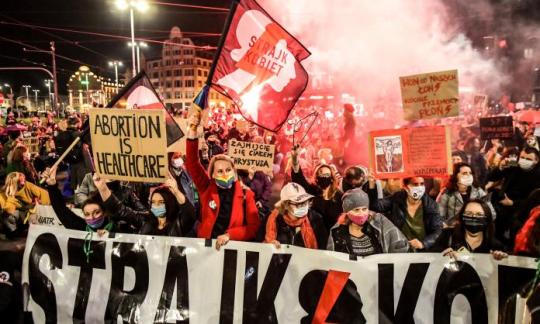
A mass movement in Poland has succeeded in delaying the implementation of a court decision that would ban nearly every abortion.
Abortions are already virtually impossible to access in Poland—the procedure is criminalised in all cases except when the pregnancy results from rape or incest, when the life or health of the woman is in grave danger, or when the foetus risks severe illness or death. On 22 October, the country’s new Constitutional Tribunal ruled that allowing abortions in cases where the foetus risks severe illness or death—which is the provision on which the vast majority of legal abortions in Poland depend—is unconstitutional.
READ MORE: 'This is war': fighting for abortion rights in Poland
10 notes
·
View notes
Photo

When the Hungarian revolution was only four days old, Peter Fryer arrived in Hegyeshalom, a small town on Hungary’s border with Austria. Fryer had been a writer for the British Communist Party’s Daily Worker for eight years; he had reported approvingly on the Hungarian regime’s show trials in the late 1940s. Now, in 1956, he was being sent to report on what his Communist Party described as a counterrevolutionary putsch aiming to overthrow a socialist government. Fryer wrote that on his arrival in Hungary, he thought he was setting foot in “a country where ‘we’ were in power. A country where a new life was being built, where the workers were in command”. He expected to see ordinary workers enthusiastically defending the government against a fascist insurrection. What he witnessed was the opposite.
A working class revolution was attempting to free the country from the shackles of national oppression which the Russian regime was imposing upon it. The revolutionary process was developing through the construction of workers’ councils, modelled on the soviets of the Russian revolution of 1917. “I saw for myself that the uprising was neither organised nor controlled by fascists or reactionaries”, he wrote in Hungarian Tragedy, the book he published while the revolution was being crushed by Russian tanks, and which became a classic account of a modern workers’ revolution. In Hungary, Fryer witnessed "a people's revolution–a mass uprising against tyranny and poverty".
READ MORE: Stalinism versus revolution: Hungary 1956
1 note
·
View note
Photo

Since the horrific killing of Samuel Paty in Conflans, the French government has been trying to revive its fortunes with a drive for national unity. But behind calls to defend free speech, the government is launching an extraordinary offensive of Islamophobia and reaction. Now the national education minister has suggested that anyone who denounces Islamophobia should be seen as part of the camp of "Islamo-leftists", guilty of intellectual complicity with terrorism.
The murder of Samuel Paty, a history teacher at Conflans Saint Honorine school, has aroused strong emotions. Teachers have complained for years that they feel isolated and exhausted; they were profoundly shocked by the event, which only seemed to reinforce those feelings.
In the country at large, widespread horror and shock have strengthened the government's call for national unity.
Thus Emmanuel Macron spoke of the importance of "unity" against "those who cultivate hatred of the other", of "Islamists that would steal our future". The president made a very ideological speech at the Sorbonne, invoking the legacy of figures like Jaurès, Victor Hugo, and Louis Pasteur: "In France... the lights [of the Enlightenment] will never go out."
READ MORE: Emmanuel Macron's right-wing campaign against 'Islamo-leftism'
1 note
·
View note
Photo

The 1970s promised so much—gay liberation had broken through homophobic hate, and life for LGBTI people was being transformed. As the 1980s arrived, so too did homosexual law reform, anti-discrimination laws, gay media and a thriving gay culture. But then came a mysterious disease that seemed to target gay men, its cause and mode of transmission unknown. Suddenly, gay sexuality was stigmatised all over again, with panicky headlines referencing a “gay plague” or, in the case of Melbourne’s Truth newspaper, the overtly homophobic “Die, you deviate”. Talk of forced quarantining, compulsory testing and surveillance of gay men was everywhere.
In the US, President Ronald Reagan refused to utter the word AIDS in the first four years of the crisis, despite 60,000 being infected and 28,000 dying. As late as 1987, the US Congress banned the use of federal funds for AIDS prevention or for education that was in any way supportive of homosexuality. “Nobody left those years untouched”, wrote journalist David France, “not only the mass deaths—100,000 in New York alone—but also the foul truths that a microscopic virus had revealed about American culture: politicians who welcomed the plague as proof of God’s will, doctors who refused the victims medical care, ministers and often parents who withheld all but the barest shudder of grief”.
But LGBTI people were coming out of a period of activism and, despite the initial shock, were prepared publicly and defiantly to fight any attempt to take away what they had won.
READ MORE: Silence = death! Action = life! Activism in Australia's AIDS crisis
2 notes
·
View notes
Photo
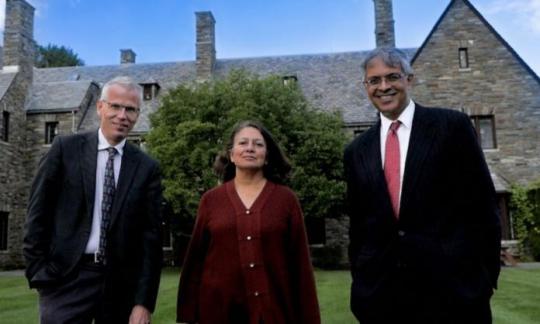
We have been constantly told during the COVID-19 pandemic that we must follow the advice of the experts. As health experts are guided by what we believe to be objective data and science, many feel no need, or don’t feel confident to be critical of expert opinion. For the most part, this is a good thing. But what happens when different groups of experts have wildly divergent views?
Such is the case with expert advice on the best ways to deal with COVID-19 pandemic. In the early months of the pandemic, some health advisors—such as Sweden’s chief epidemiologist Anders Tegnell—championed herd immunity, while those in Australia and New Zealand advocated for widespread restrictions to suppress transmission. Individual health experts have, in addition, been inconsistent in their advice. Victoria’s Chief Health Officer, Brett Sutton, for example, has shifted his opinion around masks, the safety of schools and who should be tested on what sometimes feels like a weekly basis. Clearly, there is more to expert opinion than the objective truth, and we must consider the influence that capitalist ideology has in shaping the advice health experts are providing about COVID-19.
The Great Barrington Declaration is one of the most recent cases that has provoked major controversy among health experts. Authored by three professors in infectious disease and epidemiology from Harvard, Stanford and Oxford universities, the Declaration claims that lockdowns are devastating for public health and proposes an alternative “focused protection” strategy.
READ MORE: ‘The Great Barrington Declaration’: ideology and expertise under capitalism
1 note
·
View note
Link
Less than ten days into his term, Zempilas denied the existence of trans people on talkback radio station 6PR, saying: “If you’ve got a penis, mate, you’re a bloke. If you’ve got a vagina, you’re a woman. Game over”. He continued to ridicule trans people, offering $100 vouchers to any who called in to share their thoughts.
Prior to becoming mayor, Zempilas made a name for himself as a television presenter and radio shock jock. In a bigoted, pro-business election campaign he promised to remove homeless people from the CBD, by force if necessary.
Speakers at the protest denounced the undemocratic nature of the mayoral election, in which business owners have twice the voting weight of individuals. Zempilas won with 1,855 votes (29 percent), which is approximately a fifth of the number of people who have now signed a petition calling for him to resign. The rally called for his immediate resignation and for his salary to be donated to TransFolk of WA, a support service for trans people.
5 notes
·
View notes